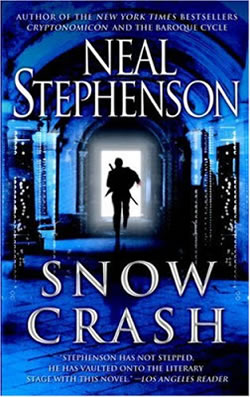
It’s not Zombie Jesus that you need to fear on Easter…
Update: Eagle-eyed reader “CC” pointed out in the comments that this was created by Michael Sowa.

It’s not Zombie Jesus that you need to fear on Easter…
Update: Eagle-eyed reader “CC” pointed out in the comments that this was created by Michael Sowa.

The dream of the nineties may be alive in Portland, but here in Accordion City, some of us — seen recently on Queen Street West, just west of John — are about the eighties. Specifically, the funktastic eighties.
In these guys’ honour, I’ve included some fine jams from 1989 by Toronto hip-hop artists. Let your backbone slide!
I have no idea whether the upcoming Star Trek videogame based on the current movies is any good, but I love the promo starring William Shatner and a guest star from the original series:
In case you’re not familiar with the big green lizard-like alien — a Gorn — it’s from this episode:

If North American cable-and-internet providers were honest, they’d produce an ad that went like this. Note that there’s some swearing involved, as is often the case with cable-and-internet providers.

Randy: Hi, this is Randy. I saw your penis for sale on Craigslist. Is it still available?
Randy: If so I would like to come take it for a test drive tonight sometime.
Seller: Hi Randy, im selling a prius. Is that what you meant?
Randy: YES!!! Apologies new phone
Seller: Well it’s craigslist. You never know.
 It’s been over twenty years since Neal Stephenson’s “cyberpunk” novel Snow Crash was first published. A young Cory Doctorow, then working at the sci-fi bookstore Bakka Books, saw me in my engineering jacket from Crazy Go Nuts University and convinced me to buy it.
It’s been over twenty years since Neal Stephenson’s “cyberpunk” novel Snow Crash was first published. A young Cory Doctorow, then working at the sci-fi bookstore Bakka Books, saw me in my engineering jacket from Crazy Go Nuts University and convinced me to buy it.
As is the tradition with the best science fiction, Snow Crash is is densely packed with all sorts of interesting ideas about present-day society, somewhat disguised in the wrappings of what was then the near future. Stephenson has a gift for illustrating them, and a number stand out in my mind even years later, such as how children’s pajamas of that near future could either be fireproof or non-carcinogenic (but not both!), or how every guy under 25 secretly believes that under the right circumstances, he could’ve been the biggest badass in the world.
I first read the book in late 1992, soon after it was published. It had been only a couple of years since the killing of fourteen women at Montreal’s École Polytechnique, a couple of months since Anita Hill’s testimony at Clarence Thomas’ confirmation hearings, and Naomi Wolf’s The Beauty Myth and Susan Faludi’s Backlash: The Undeclared War Against American Women were often-discussed topics on my university’s campus. All this, along with my own sense of social justice, is likely why of all the interesting ideas that Stephenson put into Snow Crash, the one that stands out most for me was how men in tech viewed women in tech.
Here’s the excerpt, with some added formatting. Given what’s going on in the world of tech today (including the surprised reactions at the discovery that the person who runs the wildly popular I Fucking Love Science Facebook page is a woman), it’s still spot-on:
Her name is Juanita Marquez.
Hiro has known her ever since they were freshmen together at Berkeley, and they were in the same lab section in a freshman physics class. The first time he saw her, he formed an impression that did not change for many years: She was a dour, bookish, geeky type who dressed like she was interviewing for a job as an accountant at a funeral parlor. At the same time, she had a flamethrower tongue that she would turn on people at the oddest times, usually in some grandiose, earth-scorching retaliation for a slight or breach of etiquette that none of the other freshmen had even perceived.
It wasn’t until a number of years later, when they both wound up working at Black Sun Systems, Inc., that he put the other half of the equation together. At the time, both of them were working on avatars. He was working on bodies, she was working on faces.
She was the face department, because nobody thought that faces were all that important — they were just flesh-toned busts on top of the avatars. She was just in the process of proving them all desperately wrong. But at this phase, the all-male society of bit-heads that made up the power structure of Black Sun Systems said that the face problem was trivial and superficial.
It was, of course, nothing more than sexism,the especially virulent type espoused bymale techies who sincerely believe that they are too smart to be sexists.